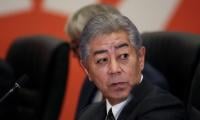ISLAMABAD: The Supreme Court was told on Monday that the Supreme Judicial Council’s proceedings against a judge facing the charges of misconduct became infructuous after the judge either resigned or got retired.
A five-member larger bench of the apex court — headed by Justice Aminuddin Khan — heard the intra court appeal (ICA) of the federal government against its judgment delivered in 2023 in Afia Sheharbano Zia’s case, holding that the judges who retire or resign do not fall within the ambit of Article 209 of the Constitution that determines misconduct of the superior court judges.
The other members of the bench included Justice Jamal Khan Mandokhel, Justice Hassan Azhar Rizvi, Justice Musarrat Hilali and Justice Irfan Saadat Khan. The court on February 12 after declaring the ICA as admissible decided to appoint amici curies (friends of court) for assistance in the matter.
The federation — through secretary law and justice — had filed the ICA with the apex court under Section 5 of the Supreme Court (Practice and Procedure) Act 2023 read with Article 184(3) of the Constitution against the judgment dated June 27, 2023 delivered in Afia Sheharbano’s case.
The federal government had prayed the apex court to set aside the impugned judgment after allowing the instant ICA. It was also prayed to hold that a judge against whom the proceedings were initiated under Article 209 of the Constitution ought to be proceeded against and his resignation would not result in abatement of such proceedings.
It is pertinent to mention that the need for challenging the judgment in Afia Sheharbano was propped up after the resignation tendered by Sayyed Mazahir Ali Akbar Naqvi, judge of the Supreme Court, when the Supreme Judicial Council (SJC) is proceeding against the judge on misconduct complaints filed by various lawyers as well as the Pakistan Bar Council.
On Monday, Faisal Siddiqui advocate, Moeez Jaffery and Barrister Akram Sheikh assisted the court and presented their arguments. Siddiqui argued that the SJC proceedings became useless after the retirement or resignation of a judge. He submitted that the concept that a judge was exempt from the general laws was wrong, adding that he could be proceeded against after retirement through the general laws.
Justice Jamal Khan Mandokhel asked Siddiqui if an institution started action against the judges, will the sword of fear not continue to hang over the judges in relation to the provision of justice.
The judge observed that the immunity given to judges was not for their own sake, but for the basic right of providing justice to the people, adding that one party was happy with the judge’s decision and the other was unhappy.
“If your argument is accepted, then the party who is unhappy with the decision will wait for the judge’s retirement and drag him to the courts when he retires, while the judge will continue to prove his innocence in the courts for 20 years,” Justice Mandokhel observed.
The judge remarked that the misconduct proceedings were related to the honor of a judge so that he could go home with a clean chit from the Supreme Judicial Council. Justice Musarrat Hilali asked what will happen to the charges against a judge if he resigned in the middle of SJC proceedings.
Justice Hilali observed that there was no such provision in the Constitution providing that when the proceedings against the judge were going on in the Supreme Judicial Council and he submitted his resignation, the proceedings will end.
Justice Irfan Saadat Khan observed that the SJC proceedings had been completed to an extent in the case they were looking at, in which case the Supreme Judicial Council had given an opinion.
“In a matter where the Supreme Judicial Council has given its opinion, can it be reopened?” the judge questioned. Siddiqui argued that if the implementation of the Supreme Court Practice and Procedure Act was not from April 21, but from October 11, then this appeal was not maintainable.
Justice Aminuddin Khan observed that once the Supreme Judicial Council started the process, should it end with the retirement of the judge. Justice Jamal Khan Mandokhel asked if the chief justice could hold the Supreme Judicial Council hostage.
“Can the chief Justice hear the complaint against himself in the Supreme Judicial Council?” the judge further questioned. Siddiqui submitted that according to rules, the judge against whom there was a complaint separates himself from the council, adding that the inquiry rules were only against a serving judge.
Justice Musarrat Hilali observed that the inquiry rules were completely silent on a judge against whom the proceedings were pending. Justice Mandokhel said chief justice was the head of the institution, adding that if a complaint came to the council, it was his responsibility to take immediate action.
Siddiqui submitted that anti-corruption or NAB should be used against the judges for corruption adding that no one stops these institutions from doing so. “Once a judge resigns or retires, then the council cannot act, and after retirement, the general law applies to the prime minister, generals and judges,” Siddiqui submitted.
Justice Mandokhel observed that the fact was that the common law did not apply. The amicus curie said that time had come and the common law will apply to everyone.
Siddiqui said a judge could run away from the consequences of judicial misconduct any time, adding that the Supreme Judicial Council could only recommend the judge’s dismissal, but the matter became ineffective the moment the judge resigned.
Meanwhile, Moeez Jaffery, another amicus curie, told the court that if the general laws were applied to the judges, then the independence of the judiciary will be affected while the sword of fear will be hanging on the judges.
If the general rules are applied to the judges then every judge will sit before the inspector after retirement, Jaffery said before any other forum, the judges should go through the Supreme Judicial Council for inquiry.
He submitted that after the resignation or retirement of a judge, the removal recommendation by the Council became ineffective but the action of the Council did not end. Muhammad Akram Sheikh, another amicus curie submitted that once the Council started proceedings against a judge, it could not end until giving its decision.
He submitted that once a judge was found guilty of misconduct, he could not escape the effects of removal either after retirement or tendering resignations. “Since he cannot avoid the effects of impeachment, the misconduct of a judge and the termination of his ability to be a judge are two different things,” Akram Sheikh contended.
He submitted that by ending the SJC proceedings in lieu of resignation of a judge will give an impression that the Council depended upon the will of a judge.
He submitted that accountability was necessary for independence of the judiciary and mentioned the name of a judge of Lahore High Court whose name appeared in the Panama Papers but he resigned and later on proceedings against him were stopped adding that lots of things were written about the judiciary. The court stopped Akram Sheikh from taking the name of judge and adjourned further hearing till February 21.
US State Department spokesperson Matthew Miller at the US State Department on October 01, 2024 in Washington, DC.—...
Responding to questions, spokesperson says Dhaka’s next steps to bring Hasina back will depend on India’s reply
President expressed hope that they would play their role in strengthening bilateral relations with Pakistan
Sources say that National Assembly Secretariat had initially planned to convene PAC meeting on December 26
Judge dismisses applications of Imran Khan, Fawad Chaudhry and Omar Ayub for providing evidence
New system aims to improve connectivity and address long-standing complaints of slow internet speeds







